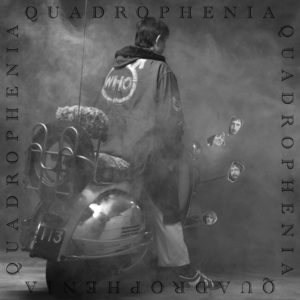
In a Rolling Stone review, Lenny Kaye described Quadrophenia as “The Who at their most symmetrical, their most cinematic, and ultimately their most maddening.” After a few listens, I agree with Kaye’s characterization. Quadrophenia is essentially two a-list songs that bookend a double album—that’s the symmetry. In between “The Real Me” and “Love Reign O’er Me,” The Who deliver their best rock opera—that’s the cinematic quality. And, like Joyce’s Ulysses or Davis’ Bitches Brew, Quadrophenia’s genius is almost impenetrable and, therefore, maddening.
Produced by The Who and written completely by guitarist Pete Townshend, Quadrophenia was released on October 23, 1973 and has since sold over a million copies in the United States.
Quadrophenia self-identifies as a rock opera set to the backdrop of the mod/rocker cultural conflict of the mid-60s. While cultural historians, like Stanley Cohen, have debunked the veracity of the mod/rocker conflict, what it boiled down to was a clash of two sub-cultural mindsets. Rockers wore leather, listened to rock music, and rode motorcycles. Mods wore frilly clothes, listened to rock music with a swing, and rode Vespa scooters. If Austin Powers and James Dean went fisticuffs at a pub one night, you’d pretty much have a mod/rocker conflict. Behind this backdrop, Townshend tells the story of a mod named Jimmy in the midst of a coming of age struggle.
For me, Quadrophenia works first as a musical work and second as a narrative work. I am drawn to the power of the singles, the instrumental segues that recast the motifs from the singles, and the hooks of the songs in between. “Bell Boy” and “Cut My Hair” often get stuck in my head after I listen to the album in its entirety. I recognize the narrative within Quadrophenia, but also hear a collection of songs that work independently of a story.
Townshend recognized Quadrophenia as the last great album from The Who. It’s definitely the last record with focused drumming from Keith Moon. Granted, many post Quadrophenia albums, like The Who by Numbers and Who Are You, are fine recordings. The difference is that The Who never pursued anything grander in scope than Quadrophenia. That contrast says less about the integrity of the band and more about the monstrous ambit of The Who’s finest hour.
A
